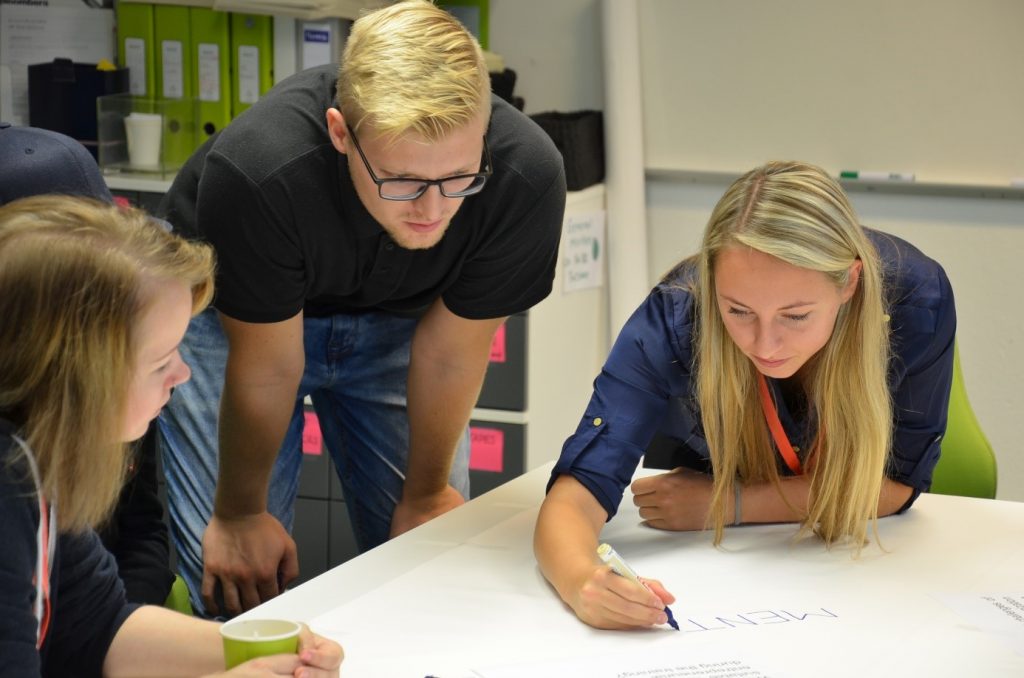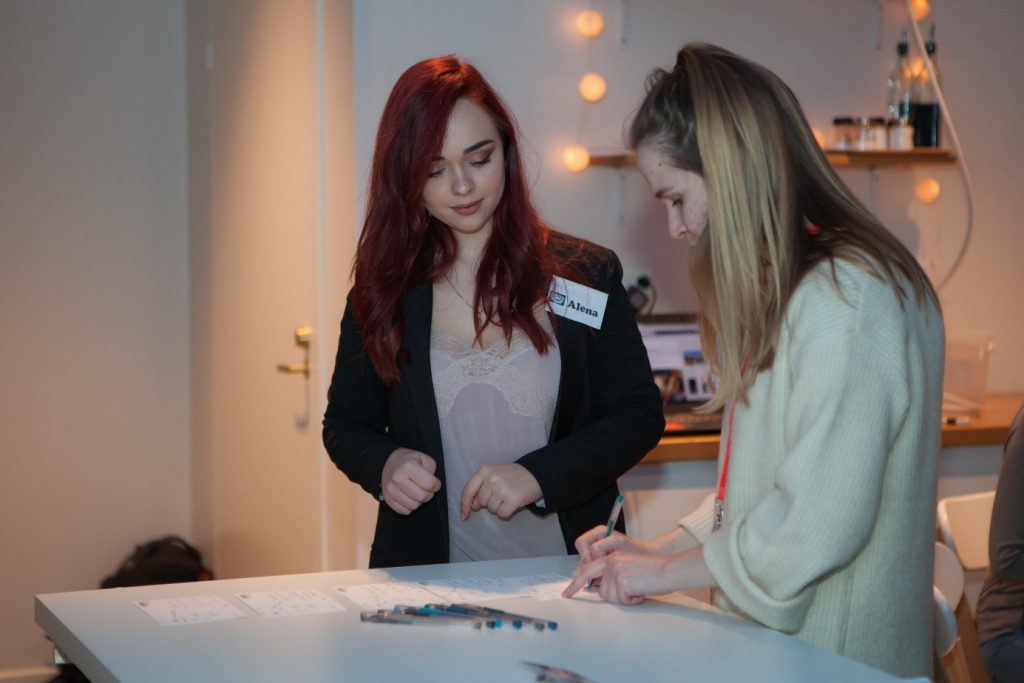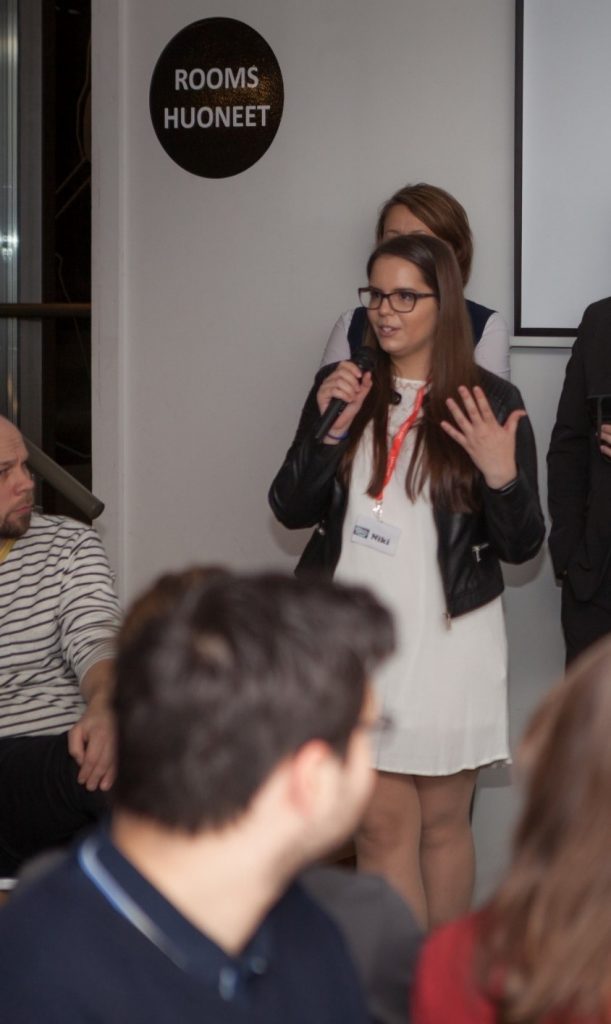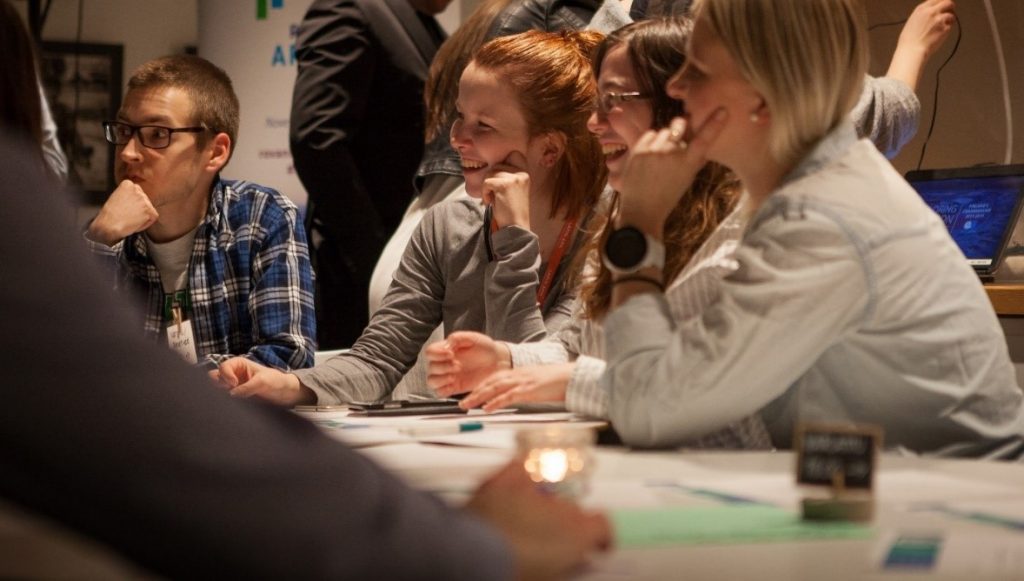Anzelika Krastina, MEd., Senior Lecturer, International coordinator, School of Business and Culture, Lapland University of Applied Sciences
Katarina Holla, IB exchange student and a trainee in Lapland University of Applied Sciences during year 2017
Nikolett Plesér, IB student in Lapland University of Applied Sciences
Alena Perervenko, IB student in Lapland University of Applied Sciences
Nina Niskala, IB student in Lapland University of Applied Sciences
Laura Ukkola, Tourism degree student in Lapland University of Applied Sciences
Abstract
The article reveals the importance of Leadership learning at Lapland UAS international degree programmes through real life project cases. Conclusion based on the interviews and reports of four different students who had a leader´s role in various real life projects shows that leaders are not born: leadership can and should be learnt.
Introduction
Team learning has become increasingly an everyday and typical educational approach at Lapland University of Applied Sciences. Team learning enables students to acquire knowledge that is relevant in contemporary work life. In team learning, the students have the responsibility to guide and regulate their actions towards set goals. However, every team, large or small needs a leader. Having variety of teamwork activities, students have the possibility to practice team leadership and develop essential leadership skills. Being involved with team learning approach for more than ten years, certain conclusions can be made. One of the most crucial observations is that young people coming to the university straight from the high school have very weak team working ability, which then is significantly developed during their degree studies, for instance in the case of International Business (3,5 years BA degree) studies. However, leadership to many young people sounds as an ability that one needs to be born with. In one of the recent classes in the group of 40 international and exchange second year IB students, to the question “are you a leader”- only one person raised the hand with the confidence. It is evident that the leadership can and need to be trained. Starting with smaller tasks and gradually through more challenging team leading tasks the leadership skills are developed. Students, that seemingly felt leadership is not for them in the beginning, reveal that actually personal growth and leadership can be learnt through actual real life project performance.
According the Forbes experts the speed of the market and our workplaces, powered by the constant stream of new technology and the “on demand” expectations it has created, will continue to accelerate. Leaders who can quickly yet effectively think, decide and inspire will be critical to keep up with these fast-changing competitive demands. (Forbes Coaches Council 2017). Warren Bennis has observed that there are too many managers and not enugh leaders. But leadership is not a position. Leadership is an influence and motivation process to follow one´s lead. It is an art of getting people to want to do what needs to be done. (Lewis P. 2003)
The article reflects the stories of various students on their leadership development through various real life projects that were part of IB studies during years 2017 and 2018. The data is collected from the interviews with the students and written reports with the permission to reflect the findings in this article.
- Katarina Holla (IB exchange student and a trainee during year 2017) from Slovakia was leading InnoBarentsLab unit at Lapland UAS known as a student project work entity that is integrated with curricula, giving the students a possibility to participate in, initiate and carry out actual real life business, social entrepreneurship and innovation projects. (InnoBarentsLab 2017)
- Nikolett Plesér Hungary (IB student) was leading the project called Arctic Youth Forum – first of its kind dialog platform between policy makers and young people in the Arctic region. The forum took place on 13 November 2017 in Rovanimi, Finland as a side event of international Rovaniemi Arctic Spirit conference. (Arctic Youth Forum 2017)
- Alena Perervenko from Russia (IB student) was leading one of the teams of Arctic Youth Forum
- Nina Niskala (IB student) and Laura Ukkola (Tourism degree student) both from Finland are leading organization of the seminar Northern Stars – Creative Entrepreneurship in the North, that takes place on 20 April 2018 in Rovaniemi, Finland. (Northern Stars 2018)
Katarina´s leadership learning story as InnoBarentsLab leader at Lapland UAS

Picture 1. Katarina (first from the right) leading IBL team innovation workshop. Picture: Anzelika Krastina
This is how I would describe myself a few months ago: I am Katarína Hollá, trainee at the University of Applied Sciences, good at…hmm, what? To answer this question, I needed to think very hard and it was not easy for me to answer. I was a shy girl with some pretty good skills but I was not able to present them, present myself.
And this is who I am now: My name is Katarína Hollá, I come from Slovakia but currently live in Rovaniemi. I am the leader of InnoBarentsLab and am working on 8 different projects at the same time. I am currently part-time employed by the University of Applied Sciences and aiming higher! I am a fast learner with good managing skills. What else I would like to add? Just hire me and see what I am capable of! That’s how I would try to sell myself to my future employer or even colleague. How did I become the person who manages everyone and stands behind her opinion? How did I become this person from that shy girl who couldn’t even speak up for herself? InnoBarentsLab happened!
Let´s start from the beginning. In September 2014, I came to Rovaniemi as an exchange student wanting to explore the country and get some unforgettable experiences from living abroad. In May 2015 I was leaving full of new knowledge about international business, project planning, marketing and so much more! I can say that I have gained more knowledge usable in real-life than during 2 years of studying at my home university as we have been studying mostly theory. I have decided to come back and gain even more of these valuable experiences. In September 2016, I came back to Rovaniemi but this time not as a student but as a trainee with head full of expectations. During the autumn semester, I have been able to work on many different projects and gained enough confidence to become a leader of InnoBarentsLab at the beginning of 2017. This is when all the fun began!
Spring semester 2017 have been busy for every member of IBL. We have started the semester with recruiting of new people – worth trusting. This is definitely not an easy task which has been proven lately. But I will come to the challenges of the work later. Now, let me tell you something more about the whole process of getting into InnoBarentsLab in order to work on certain projects. As I have mentioned already, to get students know about IBL and introduce them to IBL´s activities, we have a recruitment period. During this time, IBL has been presented to students via presenting it during lectures or personally face-to-face. I have chosen to do recruitment personally as I wanted to work with people who I can rely on and who are capable of hard work. To begin participating in certain project the person needs to fill in Project Work agreement which is then approved by our tutor teacher. This assures the involvement in the project and responsibilities of the member. Once this is filled, member can start working on his tasks or own projects. During this process, he needs to write down every single hour he spent working for InnoBarentsLab with brief description of the activity. This is done in order to get credits for actual studies. Oh, I haven’t mentioned that students get credits for the work of their choice in IBL? Yes, that is true. The Working Hours Report is there to prove how many hours certain member spent by doing project work. Every 133 academic hours equals 5ECTS, isn’t that great?! Now when you know more about the actual processes behind InnoBarentsLab we can go back to the challenges I have experienced during my participation in IBL.
The recruiting process is very important as you get to choose the persons you will be working with. A lot of students want to do all the extra work there is at the beginning of semester, they are very active and motivated only at the beginning, when it comes to the actual work later during the semester, they just disappear. This is one of the challenges that I have experienced as a leader of IBL. Cultural differences are also one of them, long story short, every culture behaves differently in certain situations, it just takes time to figure out who behaves how. Another challenge which I have experienced as a leader of IBL is that cooperation with companies is not always easy. Some entrepreneurs underestimate the students, which might be unmotivating. Some entrepreneurs on the other hand overestimate students and expect unrealistic results from them. Even communication is a problem for some of the entrepreneurs. All of these issues have solutions. It is important to spot them in order to solve them and learn from them. This is an experience which you truly cannot get from anywhere else than just from real life work. I am grateful for this experience, because next time some problem appears, I will be able to solve it more effectively. But let’s not be so negative and look at all the positive sides working in IBL has brought me!
There is so many positive things which I have gained during my work in IBL. The most important one is probably the one which I have already mentioned – I have learnt to start believing in myself. How did it happened? Thanks to other IBL members we could create something which had been successful and that made us all proud. The Northern Stars Seminar, fundraising campaign to build a school in Vietnam, these projects make you feel appreciated when you listen to all that positive feedback and results. I need to mention the opportunity to network, I have been able to meet so many amazing persons which I believe will once help me with my career development. It actually already had! From trainee at the university, I became an employee of the university just because my supervisor has seen my abilities and helped me move forward with my professional development. Another thing which you cannot get so easily is simply experiences. Real life experience is what everyone needs to get in order to learn certain skills deeper. Why is that? In real life, usually nothing goes as planned and you need to deal with it as efficiently as you can and you cannot learn it without experiencing it.
Leading InnoBarentsLab has given me more than I expected. I have gotten great friends, expanded professional network enormously, started believing in myself, learnt to work in team, lead people effectively, manage time, got real life experience, learnt how to solve problems without panicking and there is more! InnoBarentsLab has changed me and I am happy that it did. I recommend anyone to get involved in any extra activities or projects as much as possible! That is the way how to move your professional career to the next levels. Just do it!
Alena´s leadership learning story – Leaders are not born, they are made

Picture 2. Alena (first on the left) working on new ideas. Picture: Anastasya Photography
We learn about leadership since we are born. All of us had parents, teachers and even friends as our leaders. I always knew that I am not one of them. Not competitive, not confident, not persistent. I have been always thinking that leadership must be in a DNA: a person should be born with a specific skillset to become a good leader; it is like a talent being a singer or an athlete. I believed in a “great man theory”, because all the leaders I met are the same, with totally identical personal features like clones.
Those people have power. They lead people, but they also subdue and rule them. Leaders I knew are very categorical, they have very strong opinions and they make others believe in them. The same thing relates to their self-wildness. Moreover, they have advanced in organizational skills, and they are professionals in managing time, people, daily and long term tasks. They are good speakers, and you always want to listen to them, and you truly believe every word they say. Those leaders are active and have strong life position.
I did not have such characteristics, and I was always in a shadow, trying not to say anything extra or even share my opinion – not even close to being a leader. But everything happens for the first time, and step by step I was studying leadership skills in the university, and even have been a leader, during short group works. Those moments were always the most stressful, during my studies. However, I always knew, that a class or workshop will end in a few hours, and I will forget about it soon.
Nevertheless, time goes, lecture hours disappear from the schedule, and teachers test you, involving into practical projects, where you are supposed to implement all the knowledge you have gained. This also has happened to me, and I became a leader of a small project team within Arctic Youth Forum as an organizer of the InnoBarentsLab lounge during Rovaniemi Arctic Spirit event.
Team mates were students, whom I saw for the first time in my life. Three young Germans with different background, culture and work approaches. Three people speaking the language, which I do not know. For me, the one coming from Russia it was new challenge. Continuous work for two and a half months together towards the same goal, where I am supposed to lead, make decisions, take into account every single thing and even teach, sounded to me impossible. That period of time was a day and night long continuous challenge.
I had obstacles on every step I made. I could not collect everyone for meetings, my team did not understand what we are actually doing or why. We had conflicts, because our opinions and ways of work is different in our cultures. I could not control the progress or I was not able to give answers to their uestions always. Consequently, one week before the deadline I felt we barely have anything prepared. I knew, that those were my mistakes. I was afraid to push the team, when it was clearly needed, I was not good in explaining the tasks, their objectives and expected outcomes. Sometimes I just did not know what to do, and what step should be the next. I realized that I had to make decisions, but I was afraid that they were wrong, and I would just lead the project to collapse. It was a huge responsibility, which I could not bear.
Finally, the project has ended, it had valid result, and my teammates, exchange students went back to Germany. I have realized all the effort has been made only in a few weeks after the project. I could not believe, that we have actually done it, and that I played a big role in the project. For a moment I even felt that I was born again. Since then I know, that I have became more confident in my decisions, more rganized and more open. I started listen to people more, I understood better the whole project planning process, I learned from my mistakes and I will do my best so as not to make them again in the future. It was a great accomplishment for me as a person. Now I know that it is possible to work on leadership skills through practice and new experiences. And I know that if I made it ones, I can do it again, but even better. Leaders are not born. They are made.
Nikolett´s story – the leadership process that teaches to believe in oneself

Picture 3. Nikolett welcomes the audience at the Arctic Youth Forum. Picture: Anastasya Photography
I have been a student teams´ leader of entire Arctic Youth Forum project and have gained valuable experiences that are shared in this chapter.
The project was an interesting case for me as I have worked with three different teams on this project and all of them were much different case to the other. The first team worked mostly on the basic outline of this event and collaboration with the Arctic Centre. During the three months, this team worked together I gained great relationships and connection and worked with great motivated people on great ideas. This team was very international (six people from four countries), but balanced in the way of having exchange students and degree students. The team had a bit of language and cultural barrier, however, we managed to resolve this issue quickly and the team worked great afterwards. Everyone contributed in the best way and according to his or her strengths.
In the second team we had only four people, but all four from different countries, with only one degree student and three exchange students. I was a bit intimidated at first and didn’t know where to start with them or what kind of power distance to take. During my previous experiences in leading projects I liked to keep a low level of power distance with rather friendly way of communication. It has always worked before, but this was the way, how the people from the team were used to work also. I however noticed quickly that the students came from countries where power distance is usually high, therefore I started to doubt myself a bit. As my role also was a bit more official than before I decided to keep the ways of my communication more official but the power distance still at a low level, as I had the experience that when someone comes from a country with high level of power distance they tend to be more creative and motivated when this distance is on lower levels. This way seemed to work out fine.
In general, everyone in this team had no or only very little experience with project work. This didn’t cause much of a problem as during our first meetings I gave a very detailed introduction to team work and project management tools. Of course, at first my suggestions and tips were not used, but they quickly learnt that they are better off if they follow them. By giving good advices, helping them when needed, but still letting them to experiment with their ideas I think I earned their trust and they felt responsible to get everything done by the time.
The last team was the “core team” this is the part where I had the most struggles. Sometimes there were communication problems, there were persons who would not be attentive during the meetings and some persons were not really fulfilling their tasks. The biggest pointer for improvement for me is communication in many ways. Communication was the biggest issue as I relied on others by giving the tasks, but not receiving expected result and ending up of doing tasks myself. In the course of the project implementation, all the issues were finally resolved and we managed to implement and excellent event.
Overall, I have received such great feedback from the panelists, participants, the venue managers and we even ended up in the newspaper for a rather big article! I am utterly grateful for everyone who worked with me and supported me as now I know what I can achieve if I have a great team (or three) behind me. I came to Rovaniemi three years ago not knowing what I want to do in my life and with a little confidence and self-esteem after listening for four years in high-school that my way of doing things is just not the good way. I am so happy that I just had enough of this talk by the time I got to the application process and the start to my studies. I decided that I will do everything my way and make choices and based on what makes me happy and what I want. It is probably very millennial to say, but I was thinking that I will give my best and take responsibility for my worst, but I want my teammates to want me for who I am. I can now confirm that this worked out so well for me. Being truly myself with the good and the bad made people to trust and believe in me. It makes me to believe in myself and achieve things like the youth forum, where we actually connected young people with important people involved in decision making and possibly created something which will continue as a great movement in the future as well.
Nina´s and Laura´s story – strong determination is a leadership

Picture 4. Nina and Laura (second and third from the left) enjoying the teamwork. Picture: Anastasya Photography
Being a Northern Stars Seminar leader, or any project leader for that matter, is very stressful, but very meaningful. We can try our best to schedule our weeks by managing the times we have meetings with the team members, partners or collaborators and by making deadlines for specific tasks. But there are always matters that show up suddenly and need our urgent attention. Leadership position demands making quick judgement calls on how important every tasks are and who are the best to do them. It´s crucial for us to know our own limits and remember to ask for help when there isn´t enough time or resources to do tasks just on our own.
Extra challenge in managing Northern Stars Seminar is that we as leaders have our own goals for it but so do also all of our teams. We are co-creating by agreeing on a general objective for the whole project to be promoting creative entrepreneurship here in the Arctic region. Simultaneously we are also negotiating the amount of autonomy all teams have in order for all involved to be satisfied with the event. In the end, everything is linked together so compromises need to be made and that can result into fights at times. We resolve these fights peacefully in a democratic way and move to next issues at hand.
What we have concluded from being leaders is that showing strong determination by doing proper benchmarking, concentrating on effective mutual communication between all stakeholders and setting specific goals for tasks are the key to our event´s success. We have internalized the mindset of ´learning by doing´ and by carefully recording Northern Stars Seminar this year, we hope to make the process easier for the event organizer students next years.
Keywords : leadership, teamwork, leadership learning, future worklife skills, student stories
Sources:
Arctic Youth Forum. 2017. https://www.facebook.com/ArcticYouthForum/ Retrieved on 8.12.2017
Forbes Coaches Council. 2017. 16 Essential Leadership Skills for the Workplace of Tomorrow. https://www.forbes.com/sites/forbescoachescouncil/2017/12/27/16-essential-leadership-skills-for-the-workplace-of-tomorrow/#70e3165e54ce Retrieved on 8.4.2018
InnoBarentsLab. 2017. http://www.innobarentslab.org/ Retrieved on 20.1.2017
Lewis, J.P.2003. Project Leadership. McGraw-Hill. New York.
Northern Stars. 2018. http://www.northernstarsseminar.com/ Retrieved on 8.4.2018